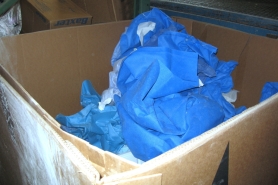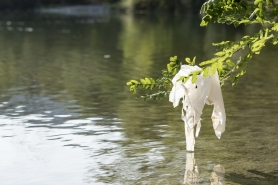Reducing, reusing and recycling plastic bags and wrap
Plastic film, which includes many types of bags and wrap, is everywhere in our lives. In part because of their convenience and abundance, though, plastic bags and wrap are often used in excess, wasted, buried in landfills or littered in our streets, natural areas and surface waters.
There are easy and cost-effective ways to reduce waste and recapture the benefits of plastic bags and wrap after their initial use. Individuals and businesses can reduce excessive use of bags and wrap, reuse them or recycle them. Industrial shrink wrap used in the packaging can be recycled and is in high demand by manufacturers as a raw material. Individuals, schools, non-profits, workplaces and communities can collect plastic bags and wrap for recycling or promote local recycling programs.
Take action
Reduce the number of bags you use and reuse plastic bags
- Reduce your use of disposable shopping bags by using a reusable bag or container when shopping.
- Reuse old plastic bags for multiple shopping trips.
- Re-purpose plastic bags as trash liners or pet waste bags.
- Refuse a bag for easy-to-carry purchases.
- Buy products in bulk.
Many grocery stores offer durable, washable bags to customers at an affordable price. Using these bags on a regular basis can create less waste than paper or plastic, and washing them regularly removes dirt and germs.
What can be recycled: more than shopping bags
If you have plastic bags and wrap you can't reuse, you can often recycle them at stores or other drop-off sites if they are clean and dry.
Many people know shopping bags can be recycled—but other household plastic wrap can too! If they are clean, dry, and free of receipts or other items, the following can be recycled at drop-off sites:
- newspaper bags;
- bread and produce bags;
- stretch film around furniture or electronics;
- plastic shipping envelopes (remove labels), bubble wrap and air pillows (deflate);
- zip-top food storage bags;
- plastic wrap around paper products, soda/water bottles, diapers, etc. and
- dry cleaning bags.
Plastic wrap that can't be recycled
Non-recyclable plastic wraps include any wrap or bag that contained frozen food, pre-washed salad mix bags and bags labeled as degradable. Any plastic wrap, bag or film that is dirty or wet should also not be recycled.
When in doubt, don't recycle it if you're not sure. Bags and wrap that are wet or dirty—or that are labeled compostable or biodegradable—can disrupt the recycling process and prevent the reuse of entire loads of recovered bags and wrap.
Take your plastic wrap and bags to drop-off locations
You can recycle clean and dry plastic wrap and bags at many grocery stores and other retailers. Use the link below or check with local stores to find out what they take.
Do NOT put plastic bags and wrap in curbside recycling bins. They get tangled in equipment at facilities that recycle cans, bottles, cardboard and paper. This puts workers in danger and causes costly facility shutdowns.
Do more: set up or encourage collection programs
Whether you are a business that generates a lot of plastic film or a consumer, there is a role for you. Learn how to do your part to build the economy, keep the recyclable plastic film out of Wisconsin landfills and put them back into productive use.
Learn how your business, retail or grocery store, or distribution center can support plastic film recycling and get involved.
Plastic Film Recycling: Tips for Businesses and Retailers [PDF]
Recycling benefits
Benefits of plastic film recycling
Recycling clean, dry plastic shopping bags, newspaper bags, wrap packaging and other plastic bags and wrap ensures that we continue to make full use of materials while conserving energy and keeping bags and wrap out of our landfills, streets and natural environment.
Environmental impacts of plastic bag use and disposal
Their lightweight and ease of use mean plastic bags and wrap require less energy for production and transportation than some other packaging materials.
At the same time, plastic bags and wrap have a number of environmental impacts throughout their life cycle. These include greenhouse gas emissions and pollution from the process of extracting and refining petroleum or natural gas, which are used to make new plastic.
They also include impacts from improper disposal, as bags and wrap can clog gutters and sewer grates, endanger animals that mistake the plastics for food, and accumulate in trees, fences and other places where they become an eyesore. Plastics can take hundreds of years to degrade and can also interfere with proper moisture distribution and drainage in landfills.
Reducing, reusing and recycling plastic bags, film and wrap helps to lessen these negative environmental impacts while promoting the continued use of the plastics we have already produced in ways that benefit the community and spur economic activity. While some cities have imposed bans or taxes on bags, reusing and recycling bags and wrap recovers these resources and contributes to a supply of plastic wrap for use by industry.
Recycled plastic bags and wrap become new products
While only about 12% of plastic bags and other film are currently recycled in the United States, according to the U.S. Environmental Protection Agency, the demand for clean scrap film is quickly growing. Plastics are long-lived and, even after initial use, can serve as feedstock in a swiftly expanding manufacturing industry.
Products made from recycled grocery bags and other plastic films include new bags, composite lumber and playground equipment. Recycling plastic bags and wrap prevents the waste of resources, reduces the amount of material being buried in landfills, helps prevent litter and contributes to new jobs in Wisconsin.
Recycling plastic film creates jobs and reduces disposal costs
Businesses across Wisconsin can also reduce, reuse and recycle plastic bags and wrap while taking the opportunity to build profits and create jobs. Grocery stores, retailers and distribution centers generate the cleanest stream of plastic film and could benefit significantly by recycling this material instead of sending it to the landfill, potentially reducing disposal costs.
By recycling bags and wrap and spreading the word, businesses can lead the way for their communities.
Compostable plastics
Compostable plastic benefits and limitations
A growing number of plastic products claim to be compostable or biodegradable, including trash bags and pet waste bags. These products should not be placed in recycling containers for plastic bags because they will interfere with the recycling process.
In some cases, compostable plastics may be a preferred environmental alternative but the case is complex. These products are only compostable in industrial facilities equipped to handle them. They will not degrade completely in a landfill or backyard or typical municipal compost facility. In fact, because composting is an aerobic process and requires oxygen, nothing "composts" in a landfill. Instead, in the landfill, such waste breaks down to generate methane, a potent greenhouse gas.
Check with your local government if you have questions about using compostable bags for their yard or food waste collections.


